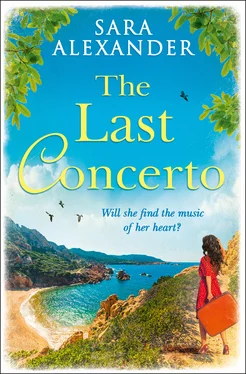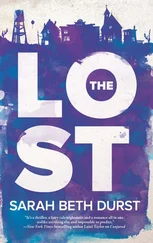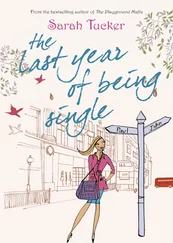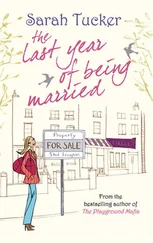Alba thought her father sounded a little drunk. It wouldn’t be unusual for him to have an aperitivo at the bar with his cronies after the morning at the officina , or to drum up more business over a Campari and soda or two, but there was more sway than usual about him that afternoon. Only when he turned for upstairs did Alba spy a fleck of lipstick on his collar. The clang of the metal serving fork upon the bowls as her mother tipped another portion of the pasta brought her back into the room. She watched the steam ribbon off the strands, fragrant with anchovy, garlic, chilli, and fresh tomatoes.
Just before the figs were brought out at the end of the meal, Lucia asked for everyone’s attention and announced she was pregnant. Alba’s father needed no excuse to crack open a bottle of moscato and the sweet wine frothed six glasses like it was Christmas. When Lucia was asked her due date, she shied around a direct answer. It wasn’t until Alba brought out the coffee that she understood Lucia’s pregnancy was almost five months along. Women on the cusp of marriage were granted different rules, it seemed.
When everyone left, the house dipped into a sleepy quiet. Bruno snored upstairs. Salvatore lay on the couch. Only the percussive sloppy grating of Giovanna washing at the tub outside cut through the stillness. Alba stepped outside into the narrow courtyard garden. Above, a canopy of wisteria wept purple blooms. Giovanna plunged a shirt into the sudsy cement tub, then lifted it and began attacking it along the ridges of the washboard, which lifted out at an angle. Her mother’s knuckles were red.
‘When are you going to tell Babbo?’ Alba asked, before realizing that it was her father’s shirt Giovanna was waging war on.
Her mother looked up at her, eyes bloodshot from dried tears.
‘Leave me now. I’ve had quite the morning, don’t you think? Sending me up there to be shamed by my daughter who has become a charity case? Have you any idea how I felt? I told you loud and clear what I thought about imposing on that kind woman. After everything she did for me when we were struggling? All those years when she would give me extra cleaning work to help us? Meanwhile you start pretending to run errands for her when all you’ve been doing is plonking that instrument. And now you stand here, silent as a cave, telling me to tell your father. You’ve got another think coming.’
She plunged the shirt into the tub again, though Alba sensed Giovanna was picturing submerging something, or someone else.
‘That’s it, stand there like a rock. I’m used to it now. I could have lost my son that night with your father. Do you know that? Or was it just a game to you? You think you’re the only one who has nightmares of that time? I did everything I could to raise you right. Do you know what your little secret means for me ?’
Now her mother wrung the shirt as if it were her daughter’s neck. Alba stepped inside. She sat at the deserted table fingering her letter. When her father came back down an hour later, dressed in a new shirt and smelling of sandalwood, she asked him to sit down. He did. Alba put the letter in front of him.
When he finished, he folded it and handed it back to her.
‘Giova!’ he yelled.
She stepped inside, wiping her suds on her apron.
‘What do you know about this?’
Giovanna looked at the letter and then at her daughter.
‘I haven’t read it.’
‘Tell him, Mamma,’ Alba interrupted.
‘You be quiet, I’m talking to your mother.’
‘It’s what Signora Elias wanted to talk to us about today,’ Giovanna replied. ‘I know you were busy. I told her that.’
Bruno twisted away from Giovanna and ran a hand over his beard.
‘Why did they write to you, Alba?’ he asked, flames flickering the fringes of his tone.
Giovanna stepped in and took a seat.
‘Tell your father, Alba.’
She looked between her parents’ faces. For a moment a spark of optimism; a fast-fading firework.
‘I have had lessons. They want me to study in Rome.’
‘I can read, Alba, I’m asking you to tell me the truth.’
Alba’s swallow felt hollow. ‘Signora Elias taught me.’
Her father’s smile was crooked. ‘Took pity on the poor town mute, did she?’
Alba took a breath, but her stomach clasped tight.
‘And you sit here, telling me you’ve spent all these years studying music, wasting your time at the old woman’s when your father has been building a business that will take care of you and your unborn children? Is that what you’re saying? Are you actually telling me you think it’s a good idea to run to Rome and play an instrument? Now I’ve heard it all. You are even crazier than they tell me. What do you have to say about this, Giovanna? You sitting there wringing your hands? You going to sit there mute as well?’
The corners of Giovanna’s lips stretched as if she were clamping whatever words were fighting their way out.
‘This is all your fault, you know that, don’t you? I said so when she nearly killed that boy! And did you listen? You both sit there with no words! You’re the most stupid women I know! My own family, imbeciles! What happened to this family? Everything I do, and this is how you thank me. Selfish, stupid little women.’
‘I had no idea!’ Giovanna blurted.
‘Even worse!’ His voice rose, a crescendo, sweeping treble notes that ascended into a painful octave. ‘The girl’s mother not knowing what’s going on under her eyes! How did that feel? Watching that old woman shame you like that?’
Giovanna took a breath to speak, but Bruno swung his hand across her face. She cried out. Alba stood up. Bruno grabbed her chin.
‘See what you did? That’s all you. You and your surly little game. Over my dead body you go. You’re not going to make a mockery of me like that.’
He pushed her down. The wood thwacked the crease between her calves and the back of her thigh.
‘I won’t hear another word of it.’ He scuffed his chair back, swung his sweater over his shoulder, and slammed the door shut.
The silence could not suffocate Giovanna’s swallowed sobs.
Piu mosso
a directive to a performer that the music of the indicated passage should have more motion, it should move more quickly
Rena Majore was a small town tucked inland of a blustery, rocky coast and a winding drive north of Ozieri. Alba and her family had visited many of the smaller sheltered coves along the eastern coast before Bruno and his brothers had settled on this place for their shared second home. The sea was rough, unpredictable and uninviting. The town was sleepy and woke up, groggy, during the summer months with a half-forgotten piazza that whispered the promise of a town centre. It was a town that attracted those in search of shelter from holiday crowds. Alba hated the place, more so now, because it was where her parents had decided to celebrate Alba and Raffaele’s engagement and graduation.
‘Go on, Alba!’ Giovanna called from the kitchen window that opened out onto the terrace. ‘Go and have fun! You’ve worked hard enough! This is your day too, you know!’
The words were ridiculous droplets of forced maternal altruism, an impeccable performance enjoyed by everyone, it seemed, apart from the person to whom it was directed. Her mother’s gushing happiness held the same violent edge as the woman’s disappointment. Since her parents put a definitive end to her visits to Signora Elias, the offer of her place at the accademia had not been mentioned again, and Alba couldn’t help feeling that the whole experience was a warped dream, or a memory she had been taught to remember. But her fingers ached. They hadn’t played since the letter was torn up in her kitchen. The deeper she sank into the numbness, the more alive her mother became; her own fading life force was feeding her. The music had spun out of Alba and into her mother; she sang of summer and love and weddings and feasts. Her pans and pots and ladles and spoons percussed joy and hope.
Читать дальше












